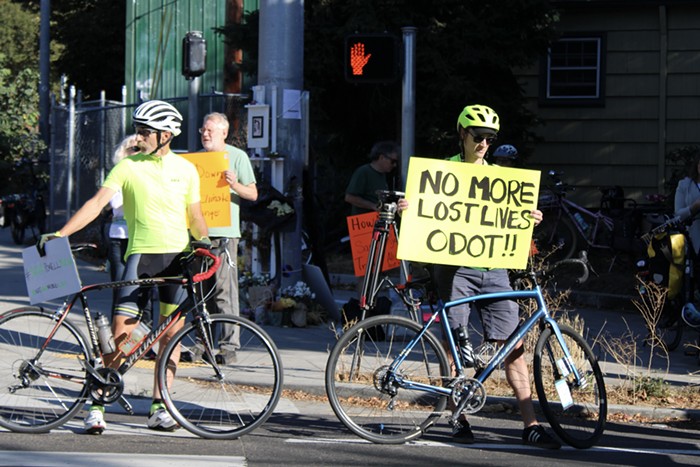The city's campaign finance program is facing something of a housing crisis.
While the City Auditor's Office oversees local elections, it has refused to take in Portland's new system for funneling public money to candidates for city office. Multnomah County elections officials have declined as well.
And now, in a situation that's raising questions about chaos and conflicts of interest, even the bureau that's been assigned to deal with the Open and Accountable Elections program has washed its hands of the matter.
Under an ordinance that Portland City Council passed in an unexpected maneuver on March 8, the system–which will give money to future candidates for city commissioner–is now under the direct control of a sitting city commissioner.
"I think we all agree that's not a perfect solution," Mayor Ted Wheeler said in a tense hearing on the concept last Wednesday, March 7. "In the short term I'm supporting this, because the program has to go somewhere."
"I can't support this in its current form," Commissioner Dan Saltzman said at the meeting. "It just doesn't look right."
Open and Accountable Elections is the city's effort to help lesser-known voices run credible races for city office such as city commissioner, city auditor, or mayor. It's slated to debut with the 2020 races for mayor and city council.
The program offers candidates the option of using city funding to leverage their small campaign donations–the city has pledged to kick in up to six public dollars for every one donated by qualifying sources. To gain access to the system, candidates need to first prove they're viable by hitting certain fundraising thresholds. (Candidates for city commissioner or auditor must collect $2,500 total from at least 250 people, while mayoral candidates must collect $5,000 total from at least 500 people.) Candidates also need to agree to limits on campaign spending and the contributions they accept.
The program is a labor of love for Commissioner Amanda Fritz–and a chance to prove public financing can work after Portland's last experiment proved susceptible to fraud–but it's had a rocky start.
When city council passed the system in late 2016, Open and Accountable Elections had already struggled to find a home. Auditor Mary Hull Caballero said her office didn't have the bandwidth to institute a new election system. Neither did the county.
So, Fritz took another route, convincing her colleagues to place the system in the Office of Neighborhood Involvement (ONI), which she controlled at the time. Then Wheeler took office in 2017, and stripped ONI from Fritz's control, handing it instead to Commissioner Chloe Eudaly. Eudaly says she's too busy to implement the elections system. Which brings us to last week.
In a move first reported by the Mercury, Fritz has devised a new way to manage the elections program: rotating it among city council offices every couple of years.
The changes council has now approved create a situation where Wheeler can pick any city commissioner (or himself) to manage the program, so long as that official has more than two years left in their current term.
First up is Fritz, who'll get the program up and running before handing it off to a new official at the end of the year. Some items on her list: hiring a staff of two, and appointing a volunteer commission to advise on how the program should be run.
But this scheme brings up questions. When Open and Accountable Elections was at ONI, it was subject to the control of a bureau director who answered to a city commissioner. Under the current system, it's directly under an elected commissioner's control. That puts Portland's program at odds with most, if not all, cities that have enacted similar systems.
"It doesn't sound like it's removing conflict of interest," Saltzman said during the March 7 meeting. "You're taking a program that is in a bureau, which is at least an arm's length from the commissioner in charge. You're giving it to a commissioner."
Saltzman kept going, saying he worried that a commissioner controlling the program could be influenced by colleagues running for re-election. "We are only human," he said. "We are subject to the opinions of our colleagues."
"There's no alternative, commissioner," Fritz replied.
The tense back-and-forth led Fritz to take extreme measures to pass the ordinance. Saltzman's objection on Wednesday wound up killing a plan to pass the ordinance on the spot as an "emergency." But Saltzman was out of town for Thursday's council meeting, so Fritz called up the matter again, securing the unanimous support she needed to pass the proposal right away.
Supporters of the idea also have concerns.
"I don't even want to think about the kinds of issues that could come up if it's being run out of a City Hall office and a city commissioner has endorsed someone in a race, [or] a staff member has endorsed someone in a race," Commissioner Nick Fish said last week. "There are political issues that come up that create the appearance of tilting one way or another."
In fact, pretty much everyone sees flaws in the scenario.
Richard Briffault, a campaign finance expert and law professor at Columbia University, echoed Saltzman's concerns about a possible conflict of interest. He says the system would be improved if Portland created a citizen commission to run the program–as opposed to one that offers advice.
"Shifting responsibility from one commissioner to another every couple of years sounds like chaos," Briffault said.
Kate Titus, whose group Common Cause Oregon has been a chief proponent of the election program, concedes that Portland's getting into odd territory.
"I don't think it's the most likely scenario that commissioners are going to directly intervene and shape the rules–but the more oversight they have, the more ability they have to do that, so it's not ideal," Titus tells the Mercury.
Exactly how Portland gets out of this quandary is unclear. Every member of city council has said they want to put Open and Accountable Elections in the Auditor's Office. In a study last November, the City Budget Office concurred.
But Hull Caballero has stood firm, insisting in a January 8 memo to Wheeler that staffing and organizational limitations in her office made it a bad fit.
City officials are still hoping she'll change her mind. If not, Wheeler said last Wednesday, the program may have to be bounced from city control altogether, and put into the hands of an "external operation."
"Long term, I don't think it's a good solution or an accountable solution to have it be part of the political offices," Wheeler said. "That's too close."


















